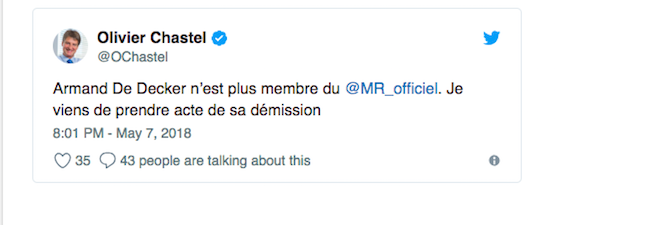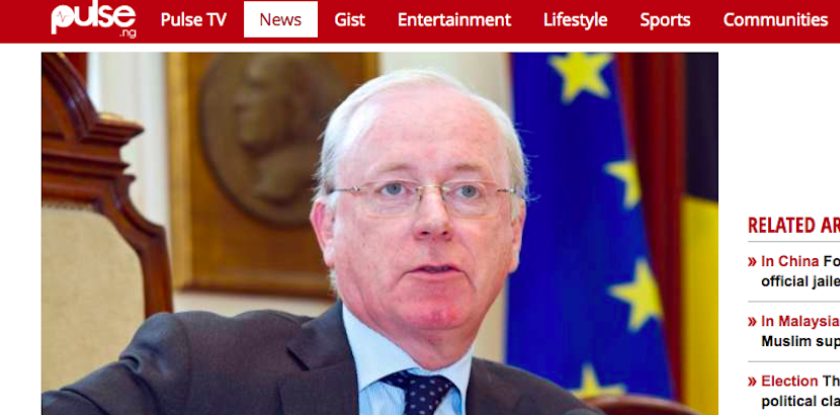Kazakhgate continues harvesting the careers and reputations of those who decided to play the game with the Kazakh authorities. This time, it is Armand De Decker, former President of the Belgian Senate and the Liberal Party org man, who has become the main hero and the victim of the scandal.
According to the Belgian media, the Mons municipal prosecutors have accused the former Liberal Senator of “influence trading”.

Armand De Decker has been masterfully mixing his political activities with the legal practice having Patokh Shodiyev as his client. Despite all his attempts to become legitimized in Belgium, the latter is still called “the Kazakh business with Astana connections” by the local press.
 Patokh Shodiyev, Alijan Ibragimov, Alexander Mashkevich
Patokh Shodiyev, Alijan Ibragimov, Alexander Mashkevich
Patokh Shodiyev is a recurring character of the Kazakhgate series. And in its last episode known in Belgium, France, and Kazakhstan as “Freedom for Shodiyev in Exchange for Helicopters for Kazakhstan”, he performed the part of the culprit of the entire scandal.
By the way, the European press is openly using the word “crime” citing the text of the indictment that states, “the crime was committed in the period between February 2011 and April 2011”. It was at that time that the Belgian Senator managed to lobby the salutary for Shodiyev legislature.
The Senator’s meeting with the then Belgian Minister of Justice Stefaan De Clerck became one of the crucial points of the accusation.

The contract for the helicopters deliveries with the French had already been signed by that time and the French prosecutors had already accused their own “cast of characters” of this episode – ex-President of France Nicolas Sarkozy, his advisor Jean-Francois Etienne des Rosaies as well as ex-Senator Aymeri de Montesquiou known in Kazakhstan as “d’Artagnan’s descendant”.
The accusation did not surprise the ex-Senator. From the very beginning of the investigation, he was on the suspects list and his name had regularly appeared in different publications of the European media. At that time, however, it was still a “simple scandal”. Now, when it has received the “crime” label, Armand De Decker, even his his serious legal defense team, will have to give up his numerous official posts.

As soon as the fact of the ex-Senator’s accusation became known, President of the “Movement for Reforms Party” ("Mouvement Réformateur") Olivier Chastel published a twit informing his colleagues that Armand De Decker was leaving the party.
 Thus, the ex-Senator has become an ex-politician. According to the local press, he has kept some of his positions in the local governmental agencies – perhaps they are to help him with his legal defense. However, he can no longer count of the political support of his allies.
Thus, the ex-Senator has become an ex-politician. According to the local press, he has kept some of his positions in the local governmental agencies – perhaps they are to help him with his legal defense. However, he can no longer count of the political support of his allies.
Essentially, the death of Decker’s political career has become the main plot twist of the local press publication. And the subtext of this plot is that same question of “why this person decided to give up all his political capital he had earned through such labors for the ties with Kazakhstan”. And even though his fellow in misery “musketeer Montesquiou” likes to talk in his interviews about the global Eurasian plans and the geopolitical conflicts they are causing, everyone believes there is only one explanation that can be expressed by just a single word – “money”.
Of course, the participants of the whole operation hoped that the history of their “strategic relationships” with Kazakhstan would fly under the radar of the law-enforcement agencies. For centuries, both France and Belgium have distinguished between the two types of the political behavior – one of their own citizens and another of the original residents of the colonies. At the beginning of the 20th century, for example, Belgium had a progressive legislature. At the same time, in Kongo that officially belonged to the Belgian King, the people were killed by millions at the plantations. This legacy has been done away with, but the tradition of using the “overseas territories” remains. Nowadays, however, the desire to put an and to this corrupting practice is evident in the European politics.
Of course, the final conclusion as to the seriousness of these intentions can only be made upon the court’s verdict. As the US part of the Kazakhgate story shows, their “heroes” have managed to end the matter without much loss. We shall see how the plot will unfold in France and Belgium.




